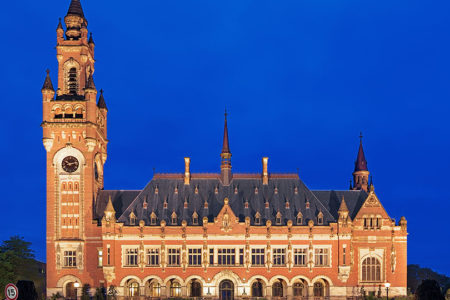God’s Care for Judah
Zechariah 1:7-21
Jewish returnees from the Babylonian Captivity immediately began to rebuild their Temple in Jerusalem.
Within two years they had completed its foundation. But Gentiles in the area opposed the project and acquired a decree from the King of Persia to halt it abruptly.
For sixteen years the work lay dormant. Like his contemporary Haggai, Zechariah called on Judah to finish rebuilding the Temple immediately because its completion was important to God’s future blessing. Zechariah did not rebuke but used words of comfort, emphasizing God’s care for His covenant people.
Zechariah’s message stirred these returnees from their apathy and moved them to resume construction with zeal (Ezra 6:14). Soon after reconstruction began, the Lord gave Zechariah a series of eight night visions (1:7—6:15) concerning God’s care for Judah’s present and future states. Zechariah received all eight visions in one night.
He did not imagine them while sleeping but received the divine revelations while awake. These visions unfold prophetic events that extend from Judah’s repatriation to the day when Israel’s Messiah will return to establish the Millennial Kingdom.
The Bible gives the exact date of these eight visions:
Upon the four and twentieth day of the eleventh month, which is the month Shebat, in the second year of Darius [January/February 519 B.C.], came the word of the LORD unto Zechariah, the son of Berechiah, the son of Iddo, the prophet (v. 7).
This was three months after Zechariah’s message on repentance (1:1–6).
The first vision involves a rider on a red horse standing among myrtle trees (vv. 7–17). The second is of four horns and four artisans (vv. 18–21). In these two visions, Zechariah revealed God’s mercy and care for His own people and the eventual destruction of Israel’s enemies.
The Horsemen
Zechariah said, “I saw by night, and behold a man riding upon a red horse, and he stood among the myrtle trees [shrubs] that were in the bottom; and behind him were there red horses, sorrel, and white” (v. 8).
The Riders. The man riding on a red, or chestnut, horse is identified as “the angel of the LORD”—a Christophany, or preincarnate appearance of the Messiah (v. 11). The other riders are angels accompanying Him.
It is evident from the text that the rider on the red horse stands above the others in dignity and authority. The riders stood in a ravine, possibly the Kidron Valley or other low area around Jerusalem, where myrtle trees grew.
Many believe the ravine represents the lowly or humble state of Judah, which was engulfed by Gentile world powers. Pictured here is the physical presence of the divine Messiah, who cares for His covenant people and stands ready to deliver them from the Gentile nations.
Behind the rider on the red horse were riders on horses of “red [bay or chestnut] . . . sorrel [reddish-brown], and white” (v. 8). Much speculation exists concerning the meaning of the horses’ colors. Yet speculation is fruitless because no symbolism is given for them in the interpretation of Zechariah’s vision.
The Mission. Zechariah asked the angel to explain the vision, and the angel complied: “O my lord, what are these? And the angel who talked with me said unto me, I will show thee what these are” (v. 9).
The word lord is a term of respect. It in no way implies that the angel who talked to Zechariah was divine. Then the angel revealed to the prophet the interpretation of his vision:
And the man that stood among the myrtle trees [not the Lord of hosts] answered and said, These are they whom the LORD hath sent to walk to and fro through the earth. And they answered the angel of the LORD that stood among the myrtle trees, and said, We have walked to and fro through the earth, and, behold, all the earth sitteth still, and is at rest (vv. 10–11).
The “man” is another angel who functioned as a go-between to interpret the vision. The interpreting angel unveiled the mission of the various riders. Like a military squad sent out on reconnaissance, they were to patrol the whole earth and report back on the condition of the Gentile world. They reported to “the angel of the LORD” that “all the earth sitteth still, and is at rest” (v. 11).
By 520 B.C., peace had been secured by the Persian Empire. The Gentile world was at rest, living in comfort and ease, free from the upheavals of war. But Judah had no rest, comfort, ease, or security amid the surrounding Gentile nations.
The Lord’s Mercy. The Jewish people, who had been chastened by the Babylonian Captivity, now needed comfort. In an unusual role, the Angel of the Lord (preincarnate Messiah) intercedes before God the Father on behalf of His people. This is a reversal of roles, for the Messiah’s role is to represent God the Father to the Jewish people.
Here is a clear picture of a plurality within the Godhead. The Messiah pleaded to the Father, “O LORD of hosts, how long wilt thou not have mercy on Jerusalem and on the cities of Judah, against which thou hast had indignation these threescore and ten years?” (v. 12).
The words how long in the Messiah’s prayer are a threefold request that God the Father would (1) remove His hand of chastening from Judah, (2) bring a speedy end to the suffering of the Jewish people after their seventy years of captivity, and (3) restore Judah and Jerusalem.
God the Father answered the Angel of the Lord through the interpreting angel. He spoke “good words and comforting words” (v. 13) concerning the consolation that Judah was about to receive. In the verses that follow, the interpreting angel described the type of mercy God would bestow on Judah.
The angel told Zechariah, “Cry thou, saying, Thus saith the LORD of hosts: I am jealous for Jerusalem and for Zion with a great jealousy” (v. 14). The word jealous implies God’s all-consuming covenant love for Jerusalem and the Jewish people. This love can be compared to a husband’s love for his wife, jealously protecting her from abuse by others. God’s jealousy includes His anger over how extremely cruelly the nations treated His city and people.
God is angry with the nations: “And I am very much displeased [literally, “with great anger I am angry”] with the nations that are at ease; for I was but a little displeased, and they helped forward the affliction” (v. 15). The Lord is twice as angry at the nations for two reasons. First, He had used them to chasten Judah for its sins; but they manifested extreme cruelty to Judah, far beyond His purpose. Second, the nations further angered God by living in comfort and ease, with little care for the conditions of His people.
The word therefore (v. 16) looks back to all that was said in the first vision and provides the reason for God’s good and comforting words to Judah. God proceeded to make six promises to Judah because of His great love for the nation and His anger toward the Gentiles’ cruel treatment of the Jewish people.
The Promises
- God will return to Jerusalem: “I am returned to Jerusalem with mercies” (v. 16). The Lord returned to His people, showing tender mercy like that of a mother’s affection for her child.
- God’s Temple will be rebuilt in Jerusalem (v. 16).
- Jerusalem’s boundaries will be reestablished. A surveyor’s “line shall be stretched forth upon Jerusalem” (v. 16) to fix the exact location of buildings that need to be constructed in the city.
- God will restore the cities of Judah with prosperity: “Cry yet, saying, Thus saith the LORD of hosts: My cities through prosperity shall yet be spread abroad” (v. 17). This promise is made to all the cities that suffered when the Babylonians destroyed Judah.
- God reassured Judah He will comfort her: “The LORD shall yet comfort Zion” (v. 17). Such news was a great encouragement to a feeble remnant of returnees from Babylon who came back with little more than the clothing on their backs.
- God reaffirmed His divine election of the Jewish people: “And shall yet choose Jerusalem” (v. 17). Although the Lord rejected Israel (Hos. 1:9) and chastened her because of sin, He never removed His divine election from her or replaced her in His program, as Replacement Theology would lead one to believe. Israel’s election stands unimpaired and secure.
These promises were partially fulfilled in Zechariah’s day. But a greater fulfillment awaits the return of Israel’s Messiah, when He will judge Israel’s enemies and will bring to full fruition the six promises He made to her.
The Horns
Zechariah lifted up his eyes and saw another vision, this time four horns (v. 18). He asked the interpreting angel, “What are these?” (v. 19).
The angel answered, “These are the horns which have scattered Judah, Israel, and Jerusalem” (v. 19). The word horn in Scripture speaks of a nation’s or individual’s invincible power. It often symbolizes Gentile empires (Dan. 7:24; Rev. 17:12) that oppose Judah. Although the Bible does not state whom the four horns represent, many commentators see them as Babylon, Medio-Persia, Greece, and Rome (Dan. 2; 7—8). The Jewish people were severally brutalized and scattered under the savagery of these nations.
Within the vision Zechariah also saw “four artisans [smiths or craftsmen]” (v. 20), workers who were skilled in shaping materials from wood, stone, and metal. The prophet asked, “What come these to do?” (v. 21).
The interpreting angel answered, “These are come to terrify them [the horns], to cast out the horns of the nations, which lifted up their horn over the land of Judah to scatter it” (v. 21). The artisans will terrify (strike fear in) and destroy the horns that severely persecuted, destroyed, or scattered Judah. Although the artisans are not identified, they probably represent each subsequent empire that succeeded in overthrowing the one before it. In other words, Medio-Persia overthrew Babylon; Greece under Alexander the Great captured the Persian Empire; the Roman Empire took over the Macedonian Greek Empire after Alexander the Great died and his kingdom disintegrated; and the Roman Empire, to be revived just before the Tribulation, is destined to be destroyed by the Messiah at His Second Coming. Then the Messiah’s Millennial Kingdom will fill the whole earth (Dan. 2:34–35, 44–45; Rev. 19:16— 20:6). God has promised Israel, “No weapon that is formed against thee shall prosper” (Isa. 54:17).
The Jewish people today can take great comfort in these promises of God’s care and preservation, knowing that Israel will never suffer annihilation by any nation (Jer. 30:11).







